
Pope Francis holding up anti-fracking t-shirts following a meeting with a group of Argentinian environmental activists to discuss water and fracking issues. The shirts read “No To Fracking” and “Water Is More Precious Than Gold.”
Meet the Newest Anti-Fracking Activist: Pope Francis.
I thought it’s worth a shoutout when the guy with a direct line to 1.2 billion people’s ears says that it’s not cool to frack. This week the Twitterverse went ablaze when Pope Francis met with Argentine filmmaker Fernando “Pino” Solanas (La Guerra del Fracking — The Fracking War) and environmental activist Juan Pablo Olsson at the Vatican to discuss fracking and water pollution. Olsson posted the photo of himself, Solanas and Pope Francis.
Next Up For Pope Francis: Anti-Fracking Activist?
Finally, a logical pope. If your belief tells you that God gave us the Earth to be stewards of, then injecting millions of gallons of water and chemicals into the ground to fracture massive rocks for their extra oil and gas and in the process threatening the air we breathe, the water we drink, the communities we love and the climate on which we all depend, seems like a really bad idea.
For a pope who has demonstrated that he is able and willing to connect some serious dots by coming out against poverty, inequality, and bigotry, stepping into the environmental arena is the next logical move. After all, it is the poor and underprivileged who have not only been taking the brunt of industrial pollution and environmental degradation that comes with the fossil fueled life but are also at the forefront of suffering the consequences of climate change. He reportedly told the group he “is preparing an encyclical about nature, humans, and environmental pollution.”
I’m really digging on Francis who is actually living up to his name as the patron saint of the poor. What I didn’t know is that St. Francis was named the patron saint of ecology by John Paul II in 1979, because of his theological connection to poverty.
“It is my hope that the inspiration of Saint Francis will help us to keep ever alive a sense of ‘fraternity’ with all those good and beautiful things which Almighty God has created,” Pope John Paul II later explained. “And may he remind us of our serious obligation to respect and watch over them with care, in light of that greater and higher fraternity that exists within the human family.”
And, of course, simply by pissing off Sarah Palin you know you’re moving humanity in the right direction.
According to one report of the meeting, His Holiness’s concern was “clear” when hearing about the Chevron deal in Argentina and other environmental disputes in the region. On Tuesday, Sarah Palin said she was shocked by the pontiff’s “liberal” statements. Wait ’til she hears about his new role as the face of Argentina’s environmentalist movement.
What I’m thinking is why stop here? What if Francis became known as the Solar Pope? Advocating for Creation Windows and Heavenly Energy, like his Lutheran brother, Pastor Peter Hasenbrink, whose church in Schönau Germany has 431 solar modules on its rooftops, generating more than 40,000 kilowatt-hours of electricity each year, enough for eight churches of its size.
So I’ll end this post with a few statements from my interview with Pastor Hasenbrink about tying Christian theology into environmental action. Lutherans in Germany have long been on board with the Energiewende, but their Catholic brothers and sisters are starting to get into it too. So this is some of the “theosolar” language Francis could use.
“God has put a lot of love into this creation,” Hasenbrink says, explaining what he considers the natural affinity between faith and environmental stewardship. “When you look around, you can only be in awe of how well-conceived everything is, and we humans are called upon to not only be beneficiaries but to intelligently and responsibly sustain this creation.”
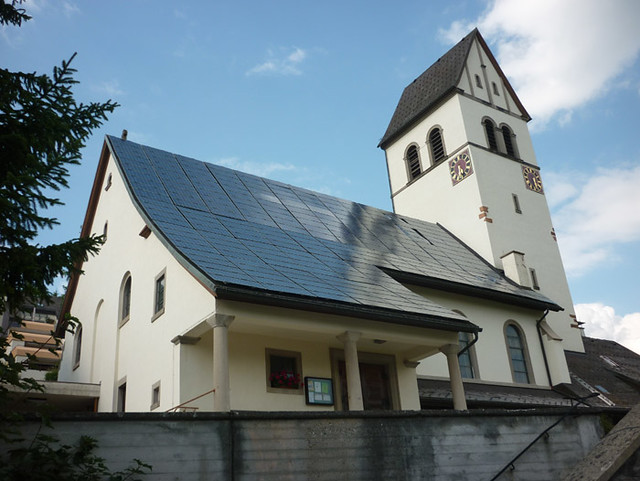
In his sermons, Hasenbrink would point to the importance of combining inner and outer work, citing St. Paul’s letters in Romans 8—“For the creation is eagerly awaiting the revelation of God’s children”—as a call to action for us caretakers to relieve the strain on the earth, to signal our participation, and to move toward salvation. “Not that we humans can or should salvage the world—Christ himself must do this—but we are God’s collaborators in sustaining this work of creation.” Hasenbrink says. “For me, and for the Christian community, this is the task of our time.”

The name “Creation Windows” was a cinch. “We thought, wouldn’t it be a great metaphor of what a church should be doing anyway, transforming the power of God into energy for our daily life? Just as electricity is a symbol of light and power, faith is a symbol of the power that God gives us to have hope and trust in humanity, to help each other and to co-create.”
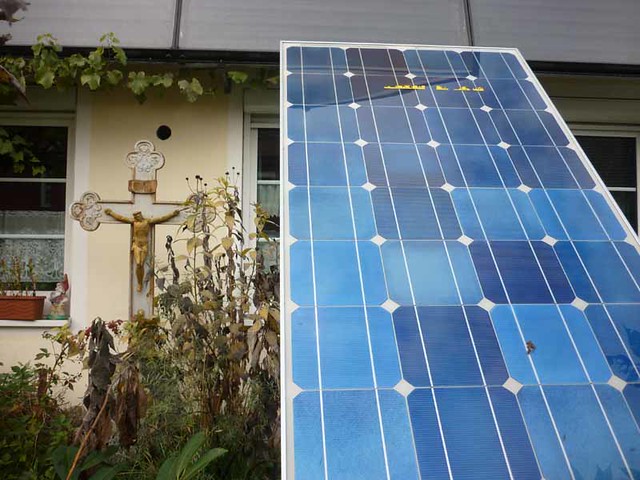
With Germany’s recent decision to phase out nuclear energy by 2022 and switch to 100 percent renewables by 2050, the small church community suddenly finds itself at the cutting edge of a new energy age. Together with EWS, the Schönau energy rebels’ cooperative, which today employs more than 50 people, provides renewable power to 115,000 homes and businesses throughout Germany, and earned Sladek the Goldman Prize. They are leading the way in a shift of both policy and consciousness that few could have imagined just a decade ago. “If we wait until powerful leaders start to do good, the train will long have left the station,” Hasenbrink says. “You have to start wherever you’re at, but if it’s many of us, then one drop will turn into a big lake. And that’s what happened here.”
Tag, you’re it, Francis!
o~O~o~O~o~O~o~O~o~O~o~O~o~O~o~O~o~O~o
For more discussion, check out my crosspost of this on Daily Kos

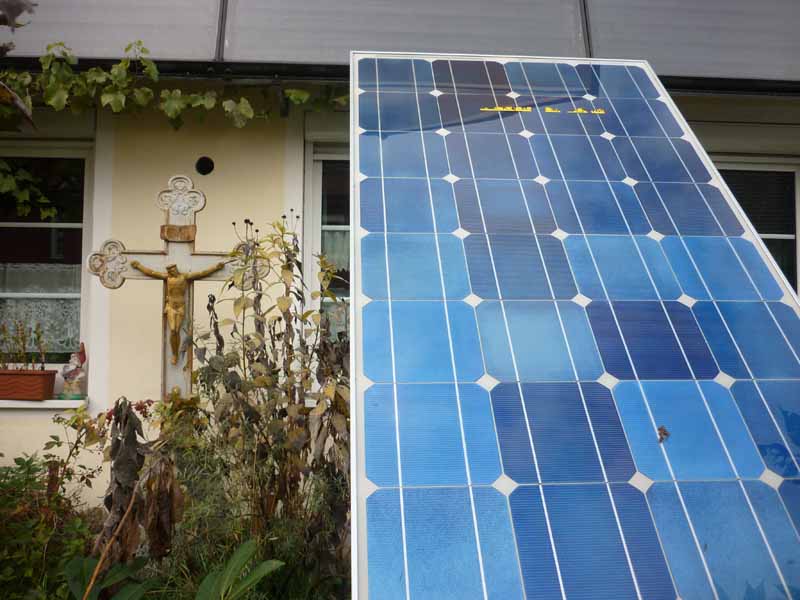
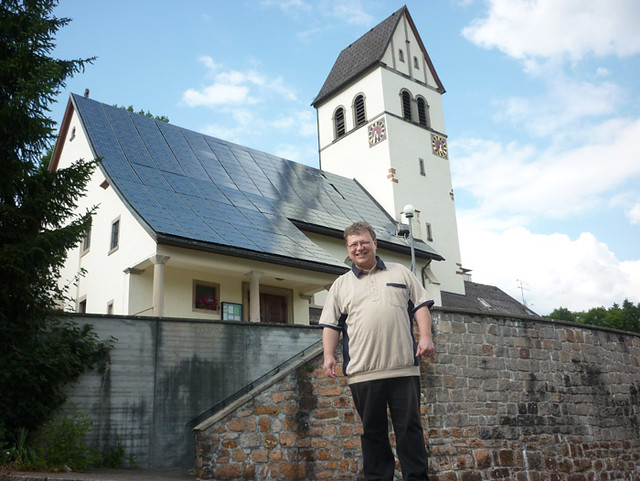
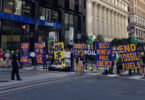





Good to see this development. This proclamation by the Pope should give a shot in the arm for awareness around the globe. Religious leaders have always had a major role to play in the direction that humanity travels in and this is a good example of positive influence.
I highly recommend the documentary “Gasland” to anyone who wants to understand how fracking impacts the people who live near where it’s carried out.
Also, it seems the Arctic was never included in temperature studies which is said to be the reason that the “average” temperature increases stalled for the last dozen or so years even as climate change continued on – http://www.independent.co.uk/environment/climate-change/exposed-the-myth-of-the-global-warming-pause-8945607.html
Thanks for checking in, Satish. I think you don’t have to be Catholic or Christian to cheer on this new pope, who seems to be willing to go against his own church’s orthodoxy in the pursuit of truth and compassion. I’m not sure how much tangible he can do to deal with the actual physical crisis of climate change, but if he can reach people who would otherwise not know or care about the environmental issues of our time, then that is a huge service.
Haven’t seen Gasland, but it’s on my list. I’m not too well versed on the fracking issue, but to me, no matter how bad the actual impact of the actual hydraulic fracturing is, the larger issue is that it’s just another desperate way to extract non-renewable resources from the planet, drilling ever more deeply and aggressively.
Ditto with climate change. I’m less and less interested in haggling over numbers of how fast the Earth is warming, just as I’m not interested in whether we have 20 or 50 years until peak oil or whether it’s already here. It’s plain obvious from all kinds of directions that humans are putting way to much pressure on the planet’s ecosystem, so we have to find ways to tread more lightly regardless of how bad things are. If they in fact aren’t beyond repair, the better, it’ll give us a chance to turn things around before it’s too late. This cartoon, “What is it’s all a big hoax and we create a better world for nothing” pretty much expresses the absurdity of haggling over CO2 levels. But even more convincing than numbers and graphs are actual documentations of what’s been going on in the Artic, as shown in Chasing Ice.
Agree, Sven. Statistics and data are generally often used to confirm one’s own pre-existing beliefs and don’t do much to convince anyone who is of the opposite view. I have seen so many debates and discussions devolve into numbers games and they get lost in details, losing the big picture. Our culture is currently heavily in favor of numbers though and it clouds what’s really going on. When we see a news item that speaks highly of a certain portable carcinogen detector, it appears as a good development with the report making it seem like it will reduce the rate of cancer, etc. The truth is it’s a symptom of a much bigger problem which is the increasing amounts of industrial technologies and other newer riskier technologies that we are adopting at an ever increasing pace and their toxic byproducts. We’re not addressing that bigger problem. An even bigger problem underlies it all: one of a warped collective psyche, an alienation from nature, a corruption of our purpose in life. The news story of the portable detector distracts from these larger problems. It’s not worth the space it’s printed on.
I’ve seen the crashing of the glacier clip. It’s in-our-face evidence. Unfortunately, sometimes, these things drive people to despair and inaction. People shut down. They go back to the familiar and the comfortable. I sometimes wonder if there’s much point in talking about these issues anymore because there seems to be enough information out there already. And when I think about how I myself learned of these things, I realize it’s because I was curious about the world around me and I would have gotten to this information somehow. Why aren’t others as curious. Where has the sense of wonder gone?
very well said, Satish. All the information is out there but we don’t seem to learn much from it. That’s the thing about information, it doesn’t automatically lead to knowledge or even wisdom, which it seems we’re not gaining much if any. It’s much more a crisis of consciousness we’re facing than some sort of technical fix, and your comments and writings speak so well to this.
One example I can think of: Universities used to be places where young and curious souls would go to learn, debate and be in awe of the grand questions and mysteries of life. When I went to college in the late 80s, it felt like almost everyone was there just as a means towards an end, getting their diploma as quickly as possible to score the highest paying job. And I think there’s even more pressure nowadays from a much earlier age to be specialized and have academic achievements so you can work your way up in a competitive market and attain a comfortable personal life.
It’s not that that’s inherently bad, but it leads to a real shortage of people who are able to reflect more deeply on the bigger questions, looking holistically at issues rather than just being specialized in one particular field. So that’s how we get the technocrats at the most esteemed positions of society, and it ultimately reflects who we are as a society. It used to be that philosophers were the most respected leaders, nowadays it’s people who invent the “like” button or figure out how to sell more things more easily.
“The best minds of my generation are thinking about how to make people click ads,” former Facebook engineer, Jeff Hammerbacher, told Bloomberg Businessweek. “That sucks,” he added.
Colleges and Universities today serve as pipelines that supply disciplined minds to the corporate sector and the state (which are increasingly becoming intertwined and inseparable). Gone indeed are the days when fresh ideas fomented exciting conversations in college hallways and university laboratories. Today, these hallways and labs are sponsored by corporate funds to conduct research on their behalf. http://nature.berkeley.edu/srr/Alliance/novartis/davis.htm
And yes, today’s professionals are highly specialized. I was dismayed to look at the year book of one of the most elite private schools in Silicon Valley (Harker). High School students there work on projects that make no sense to me upon reading the titles. They might as well be PhD dissertations from Harvard. I wrote a blog post about it here – http://goingkuku.blogspot.com/2013/01/highly-specialized-roles.html